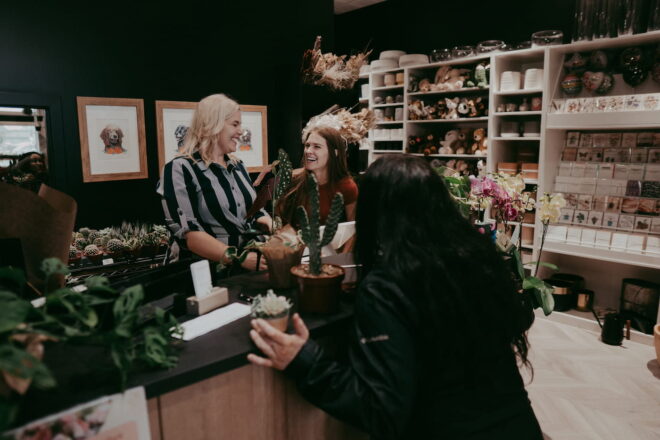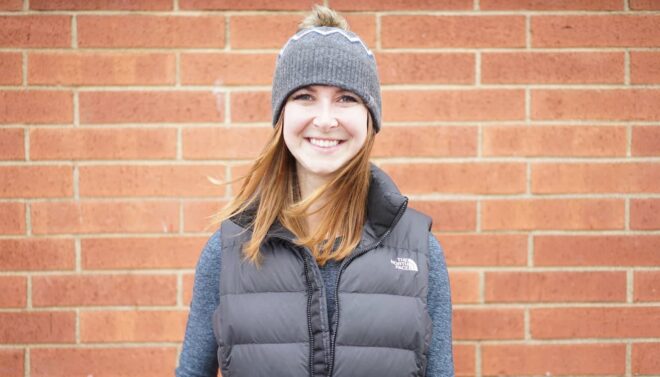Patt’s Guitar Repair
Editorial Team
7 min read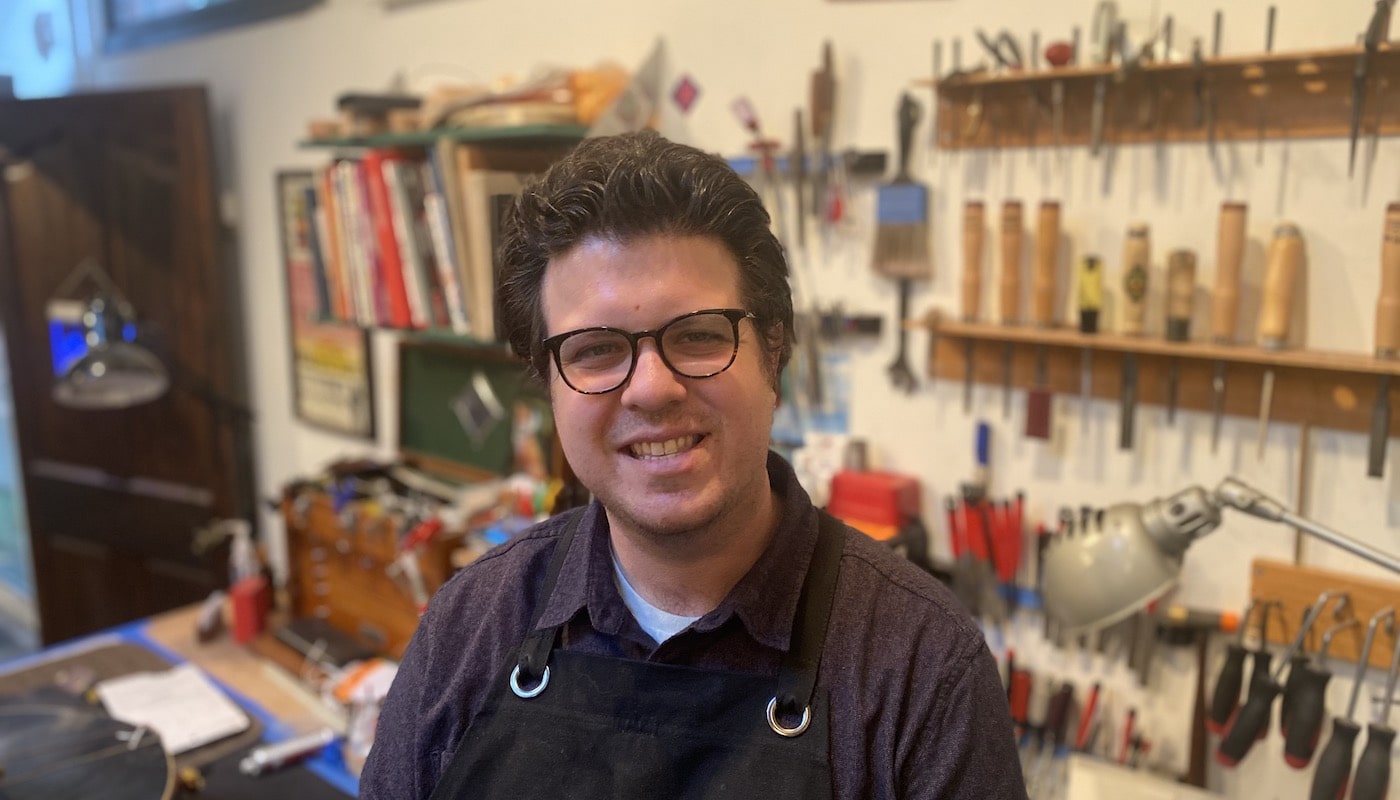
In this installment of Meet the Merchant, we speak to Paris Patt of Patt’s Guitar Repair in the Pico-Robertson neighborhood of Los Angeles. Patt started playing music at a young age and worked in another L.A. guitar shop before venturing out on his own. Patt talks about running a lean business, connecting personally with his customers, and how repairing an instrument can be like therapy for its owner.
Clover: Hi Paris! Can you tell us about your background and what led you to open Patt’s Guitar Repair?
Paris Patt: I’ve been playing music since the tender age of 2. I taught myself a bunch of instruments over the years, including piano, guitar, and bass. Music has always been a major part of my life, but the professional music industry was never really for me. It’s just not the kind of person I am; I don’t really enjoy putting myself out there in that way.
I got into guitar repair through frustration with my own instruments, and not understanding the intricacies of why one instrument sounded better than the other. I was used to repair shops where they didn’t explain much. They would just give my instrument back and tell me it was fixed and that was that. I found that frustrating, because I like to take things apart and figure out how they function.
Then an opportunity came up to work in a guitar shop, and everything followed from there. I started out working mostly in the library, where they had a big collection of books for music instruction, then moved into retail and guitar sales. When an opening popped up in repairs, I asked one of the luthiers in the shop if they would be willing to apprentice me and teach me the ropes.
As far as starting my own business, the essence of it is that when my mother passed away, unfortunately, in November of last year, she was running a nonprofit out of this location in Los Angeles. I was thinking about shutting it down, because the rent was climbing up so high. But I figured out a solution where I could move in here and open a private practice. My wife and I had been working in the art and sculpture conservation industry, so we decided to go into private practice for both guitar repair and art restoration.
Clover: What do you like about guitar repair?
Patt: I really like helping people. I always say that half of this job is psychotherapy, because there’s a lot of projection onto objects of great value to people. They tend to work through their problems through the instruments, and I like helping people reach that kind of catharsis with a tool that inspires them.
When someone brings in an instrument that’s not functioning properly, it can be very frustrating for them. You can tell they’re really passionate about music and want to play, but the instrument is not doing it for them. Once I fix or restore it, I can see how they light up and feel inspired to make music. I find that very rewarding.
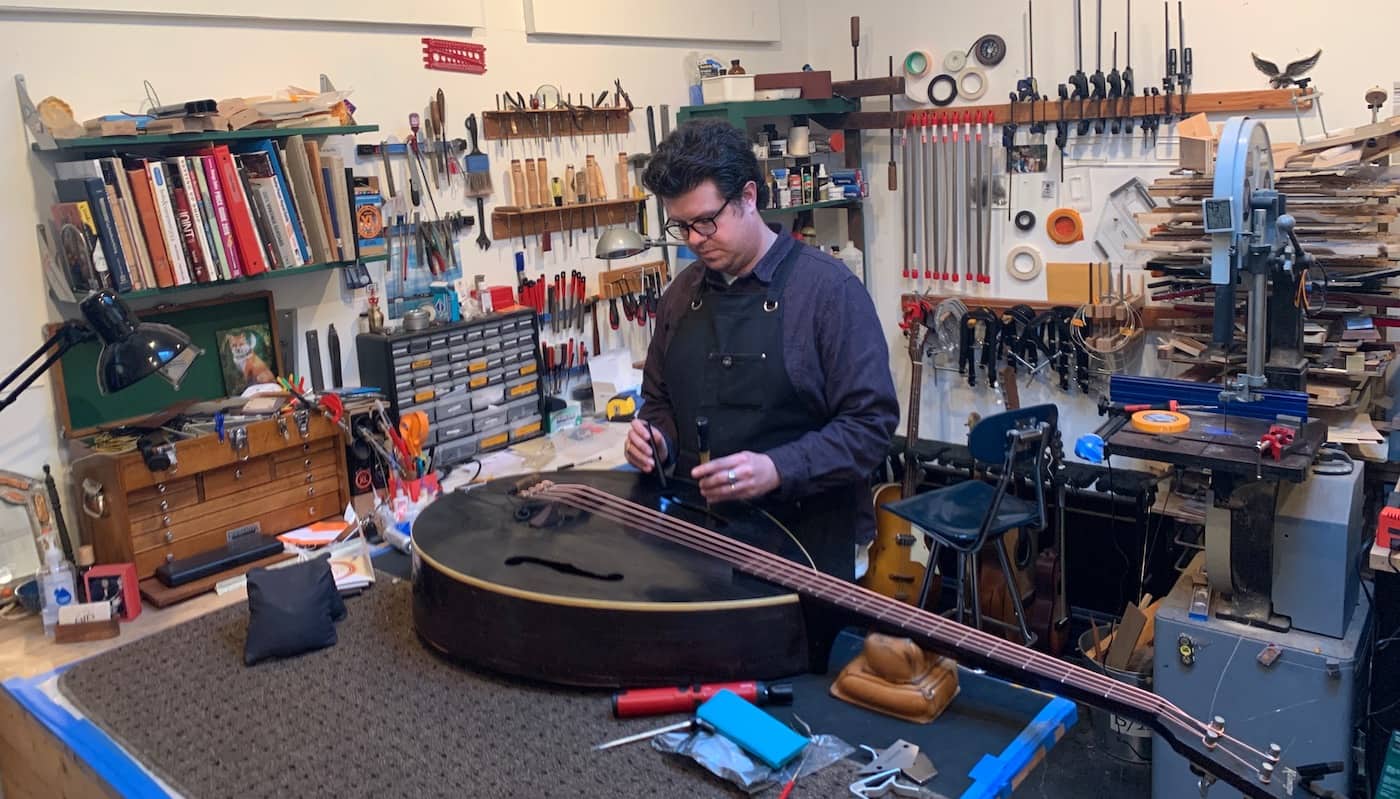
Clover: How did you go about marketing and drawing in a customer base?
Patt: My wife and I had several different business opportunities before this one that didn’t pan out, so we had been working with a pair of business planners for a while. They offered a lot of insight as far as marketing and getting the name out there. I didn’t want to just hang a shingle and see who would come. It’s definitely been mostly word of mouth and appearing in Google searches. I’ve been in the Los Angeles music scene for a while, so that helps get the word out there, too. And we happen to be in a part of the city that’s been starved for this kind of work for a very long time. So most of my customers just find me on Google. The rest of them are referred by my previous clients, which has worked out pretty well so far.
Most of the other shops in Los Angeles have anywhere from 5 to 10 people working there. I realized that part of my appeal to customers is personal, individualized attention. I’m the person who answers the phone or greets them in the shop; I’m the person walking them through what’s going on with their instrument, and I’m the one repairing it.
Clover: How was business before the pandemic, and how has it changed since?
Patt: It’s been interesting. We actually had an employee I had to let go right before the pandemic hit. I had to do a lot of soul searching about why I had a small business as opposed to being an employee myself. I realized that the highly customized skill set I offer is pretty difficult to teach someone else, especially overnight. Business pre-pandemic was good, but it wasn’t good enough to pay workers’ comp and all of the other fees that are associated with having an employee.
Once the pandemic hit and everything completely shut down, including the music industry, I actually saw a boom in business, particularly when we reopened in May. I think people were stuck at home with their instruments and were either frustrated by them, just learning how to play, or picking up an old hobby. The biggest boom came around the CARES Act, when people had extra spending cash through unemployment. I think people had been holding off, because instrument repair is kind of a luxury item; when funds are limited, obviously you don’t need to fix your guitar—you need to eat. Once people had just a little bit more cushion, they realized, “Oh, I can spend a little bit of money on myself for a change.” Now business is leveling off a little bit, and always slows down in the fall. We’ll close for a few weeks in December, as we have for the past two years.
Clover: Why did you choose Clover?
Patt: I did a lot of research about different point-of-sale systems. I had honestly been a bit turned off by the exorbitant prices of a lot of them. I wanted to get a cash register and a POS. When I talked to Clover, I found the leasing program very appealing. It has been great. I’ve experimented with some of the apps, but the only one I use at the moment is a syncing app with QuickBooks for financials. Otherwise, I use my Clover Mini for point of sale and inventory, in addition to a separate cash register.
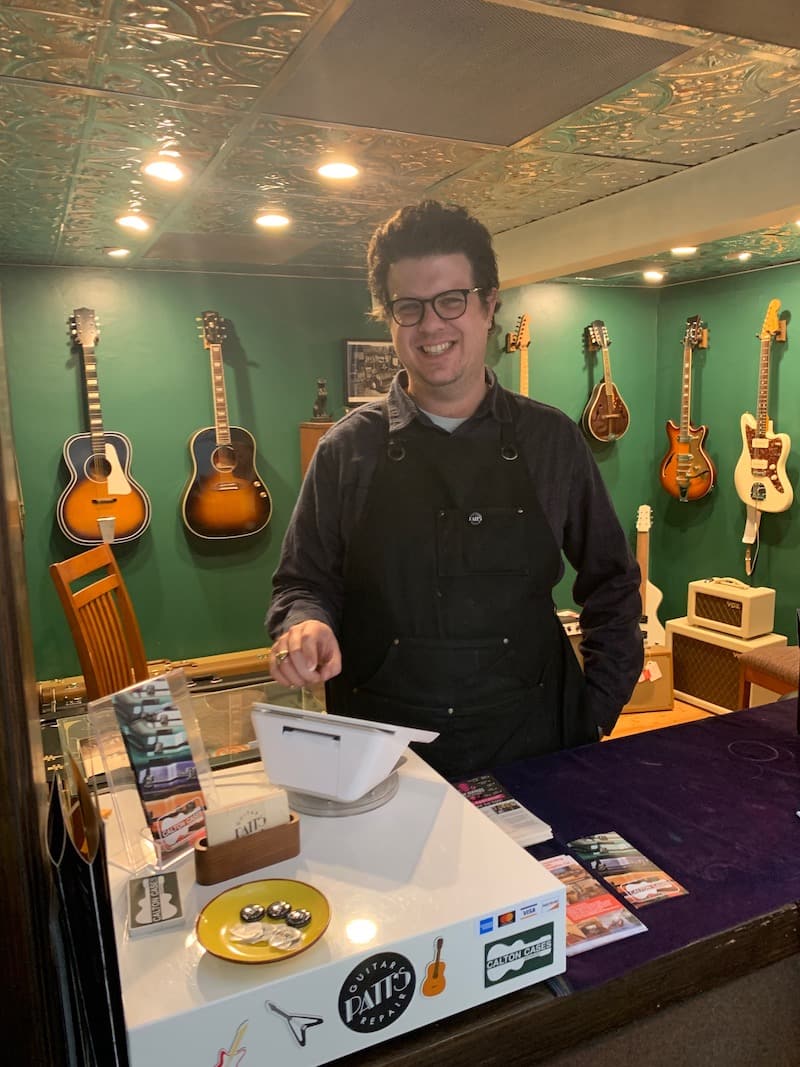
Clover: What are your plans moving forward? How do you see the next six months?
Patt: It’s tricky. We’ve been saving and just trying to anticipate a rainy day, because obviously we can’t predict the future. I’m not sure how long this boom will last or how long all the stars will align. We’re doing some outreach with our best customers to try to get referrals through them to keep things going. But Los Angeles is an incredibly pricey place to run a retail storefront. There’s very low occupancy in Pico-Robertson, in particular. Everything is closing around us, whether it’s the Starbucks up the street or mom-and-pop small businesses. It’s very bleak at the moment. So we’re trying to account for that and figure out how we can pivot.
Clover: What advice do you have to other small business owners?
Patt: My advice is to not go into an incredible amount of debt for passion and dreams. We’re at zero debt right now, but we had to be very frugal and lean. I think you can overspend to the stars and the moon if you want to, but starting a small business doesn’t always take much. In my opinion and experience, I would say it takes stick-to-it-iveness and careful financial planning—really delineating what you need versus what you want.
It’s also important to set yourself apart from competitors. Do a lot of market research, from calling other businesses and finding out market prices for goods that you offer, to figuring out how you can differentiate yourself in the marketplace. But if you are up to your eyeballs in money that you owe other people, this small-business concept that you came up with can become an albatross around your neck. The less that you’re beholden to that starting concept, the more you can still remain passionate and free thinking and figure out how to pivot, particularly when something like a pandemic happens that you can’t predict.
Read more of our Meet the Merchant stories for real-life stories of small businesses in action all over the country.
Related Posts
3B’s Flowers
Diedrich Espresso
Popular Topics
Stay In Touch
Sign up and learn more about Clover.
Thank you for your subscription!
Recent Stories
- Jewelry store supplies and equipment needed for opening day
- How small businesses can use employee discounts to retain staff
- Tips and tricks for opening an outdoor pop-up restaurant
Please share your contact information
to access our premium content.
Thank you for sharing your contact information.
Download Now
